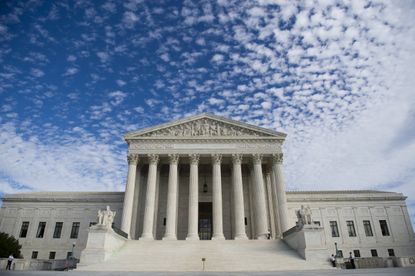Too much power for too long
Supreme Court justices shouldn't have lifetime terms


At a Fourth of July barbecue last weekend, my buddy Tom was mocking the absurdity of Hillary Clinton's attacks on the wealthy elitists she usually calls donors and friends, when my other buddy, Aron — Tom's usual foil — said Clinton's hypocrisy didn't really matter. The next presidential election, he said, "is all about the Supreme Court," so he'd vote for any Democrat. I suspect many liberals and conservatives will cast their ballots in 2016 on that same, single-minded basis — and sad to say, it's an entirely sound rationale. The court has become the most powerful branch of government, making decisions that polarized voters and a gridlocked Congress and president cannot. It's the court that decides whether gay couples can marry, how campaigns are financed, whether to pull the plug on ObamaCare or the death penalty, and even who wins contested presidential elections. Since justices serve for life, filling a court vacancy is now the president's most consequential domestic decision. The next president may replace up to four justices — and utterly reshape the court.
On Inauguration Day in 2017, Justices Ruth Bader Ginsburg, Antonin Scalia, and Anthony Kennedy will be in their 80s. Stephen Breyer will be 78. If a Democrat appoints replacements for all of them, the court would swing to a 6-3 liberal majority. If a Republican fills all four seats, conservatives would have a 7-2 advantage. Even if there are just two replacements, the court — and the country — will very likely take a sharp left or right turn and stay on that path for decades. No wonder there are growing murmurs about changing the lifetime tenure of justices to 18-year terms. Only czars and popes should expect to rule for life.
Subscribe to The Week
Escape your echo chamber. Get the facts behind the news, plus analysis from multiple perspectives.

Sign up for The Week's Free Newsletters
From our morning news briefing to a weekly Good News Newsletter, get the best of The Week delivered directly to your inbox.
From our morning news briefing to a weekly Good News Newsletter, get the best of The Week delivered directly to your inbox.
Create an account with the same email registered to your subscription to unlock access.
Sign up for Today's Best Articles in your inbox
A free daily email with the biggest news stories of the day – and the best features from TheWeek.com
William Falk is editor-in-chief of The Week, and has held that role since the magazine's first issue in 2001. He has previously been a reporter, columnist, and editor at the Gannett Westchester Newspapers and at Newsday, where he was part of two reporting teams that won Pulitzer Prizes.
-
 Is pop music now too reliant on gossip?
Is pop music now too reliant on gossip?Talking Point Taylor Swift's new album has prompted a flurry of speculation over who she is referring to in her songs
By Richard Windsor, The Week UK Published
-
 Nuclear near-misses
Nuclear near-missesThe Explainer From technical glitches to fateful split-second decisions, the world has come to the brink of nuclear war more times than you might think
By Rebecca Messina, The Week UK Published
-
 What is cloud seeding and did it cause Dubai's severe rainfall?
What is cloud seeding and did it cause Dubai's severe rainfall?The Explainer The future is flooded
By Devika Rao, The Week US Published